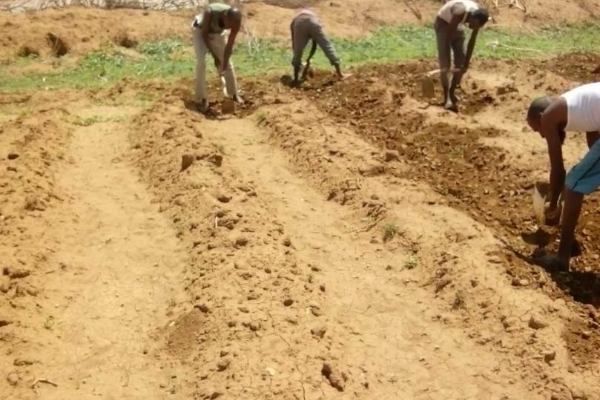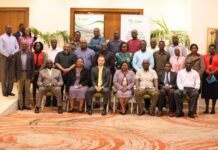Last year, around 1,250 pastoralists in Somaliland’s Hawd region, compelled by prolonged droughts as a result of climate change that severely impacted their livestock, ventured into crop cultivation. Now, they are celebrating their first successful harvests.
One of these pastoralists-turned-farmers is Abdirahman Yusuf Adan, aged 36. Recently, he sold his maize, sorghum, tomatoes, and watermelons harvested from his five-hectare farm at Hargeisa and Balligubadle business centers. This endeavor brought him a profit of $560.
This newfound source of income has transformed Adan’s life. As a young father with 10 children, he can now provide his family with sufficient food and other essentials. This marks a shift away from heavy reliance on livestock, which had previously yielded little income due to recurrent drought cycles.
“For an extended period, we have endured the challenges of drought, which have severely impacted our herds. Nonetheless, we have managed to cultivate crops on our farms, enabling us to provide sustenance for our families and generate income by selling surplus produce,” said Yusuf.
The pastoralist-turned-farmer, who once owned 400 goats, saw his flock diminish to just 50 due to illness and drought. Now, he is strategizing to maintain a manageable number of animals, raising them until they reach market size to sell for profit.
His journey into farming began towards the end of last year when he sold some of his remaining goats for $56. With this money, he purchased seeds in preparation for the rainfall in October. Additionally, his farm yields fodder crops to sustain his goats.
Similarly, Khalid Haybe Hussein, another pastoralist from the same area, transitioned into crop production. He manages a four-hectare farm in Gumburaha village and has successfully harvested crops for the second time.
“The hardship brought about by drought has forced us to constantly search for scarce pasture, disrupting our lives. In response, we’ve embraced crop farming as a means of survival. Now, we can comfortably feed ourselves and our families,” said Hussein.
In July 2023, he celebrated his inaugural harvest, boasting sorghum, maize, watermelons, tomatoes, and peppers. He successfully sold his produce to various businesses in Hargeisa, Balligubadle, Salahley, Gumburaha, and Qool-Aday, pocketing a profit of $4,000.
With a portion of his earnings, he invested in two camels valued at $2,500 and acquired a plot of land to expand his agricultural endeavors. Reflecting on his journey, he remarked, “Life has transitioned from pastoralist to farmer, offering us opportunities to increase our income.”
Furthermore, Hussein has established a roadside sales outlet, generating $10 to $12 in daily revenue. However, he acknowledges the need for proper training in pest and disease identification and management to mitigate losses caused by these challenges.
Aidarus Farhan Muhumed, the agriculture ministry coordinator in the Hawd region, disclosed that there are a total of 4,500 farms in the area, which include 1,250 owned by pastoralists.
“Hawd, characterized by its arid climate, relies heavily on rainwater for agricultural purposes. With limited access to groundwater, residents store rainwater in catchment areas to sustain themselves during the dry season.”
A water catchment build in the area in May 2023 is now accessible to all farmers.
“The ministry is dedicated to enhancing the livelihoods of farmers by assisting them in land cultivation and providing essential seeds. A total of 425 families have benefited from this initiative, receiving seeds and having their land cultivated,” said Farhan.
Additionally, the ministry has conducted training sessions to enhance farmers’ agricultural skills, provided pesticides, and facilitated the establishment of a farmers’ association, he added.









